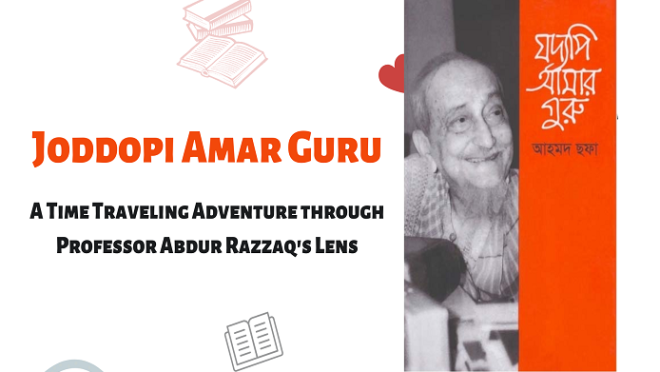Book Review : Joddopi Amar Guru
Book Review : Joddopi Amar Guru

Imagine a bioscope, which when looked into, reveals all the historical characters labouring away in real time, doing the work which will be written in history books for you to study.
“Joddopi Amar Guru” takes readers on such a captivating journey through time, offering a unique perspective on legendary figures such as Kazi Nazrul Islam and Bangabandhu Sheikh Mujibur Rahman.
These fascinating stories are presented through the speeches of Professor Abdur Razzaq and narrated by Ahmad Sofa.
Delving into the lives of historical characters, this collection provides a glimpse into their significant contributions, as witnessed by Professor Razzaq.
Despite his invaluable insights, Professor Abdur Razzaq remains relatively unknown to most.
Born in 1914, this renowned intellectual pursued his education at the University of Dhaka in 1931. He later embarked on a PhD journey at the prestigious London School of Economics under the tutelage of Harold Laski, a prominent economist and political figure of that era.
However, due to Laski’s untimely demise, Professor Razzaq returned without completing his PhD, which was subsequently published as a separate book titled “Political Parties of India.”
Ahmad Sofa’s first meeting with Professor Razzaq was marked by an awkward atmosphere.
The professor resided in a modest flat and was found sleeping on a small bed, surrounded by what Sofa referred to as a “collection of libraries.”
Professor Razzaq’s narratives maintained an authentic touch with his old Dhaka accent, which Sofa preserved while recounting his stories.
The book predominantly employs the “Dhakaiya” tone, offering a blend of humour and linguistic challenges due to the rough old Dhaka accent.
Professor Razzaq’s experiences make him a living footnote in history. He witnessed Kazi Nazrul Islam’s performance at Dhaka University and shared anecdotes of his encounters with Sher-e-Bangla AK Fazlul Haque, seeking permission to pen his memoir.
The book also delves into the depth of Bengali literature and explores the origins of Muslims in the subcontinent. Professor Razzaq’s political views aligned with the Muslim League during the partition of India in 1947. He actively participated in political campaigns advocating for the rights of Bengal Muslims.
An intriguing story unfolds within the pages of the book, depicting Professor Razzaq’s support for the artist SM Sultan, a friend of Ahmed Sofa. Professor Razzaq welcomed Sultan into his home and provided care for his paintings. Each story showcases Professor Razzaq’s vast knowledge and his benevolent nature when assisting other creative individuals. While his generosity is commendable, Ahmed Sofa criticized his mentor for enabling others to exploit his kindness solely for personal gain.
Though Professor Abdur Razzaq remained relatively silent in the mainstream, his presence was undeniable. During Henry Kissinger’s visit to Bangladesh upon the invitation of Bangabandhu Sheikh Mujibur Rahman, it is rumoured that Kissinger spent a significant portion of the dinner exclusively engaged in conversation with Professor Razzaq.
Such encounters attest to the intellectual weight and influence he commanded.
The book also offers commentary on the post-liberation war era in Bangladesh, shedding light on the plight of the general population in a newly independent and economically challenged country.
It explores the political turmoil that accompanied the nation’s journey.
In summary, “Joddopi Amar Guru” provides a wealth of accounts from an illustrious individual, an intellectual pioneer, and an architect of the admired personalities who have left their mark on the nation’s history. Professor Razzaq’s humility and profound thoughts are truly inspiring. Through this book, readers are transported back to a historical era that prized intellectual curiosity, deep patriotism, and values that often seem absent in the modern day.
The writer Nazmul Haque is an Edge Associate of TBS Graduates from National Institute of Textile Engineering and Research. You can contact him at [email protected]


